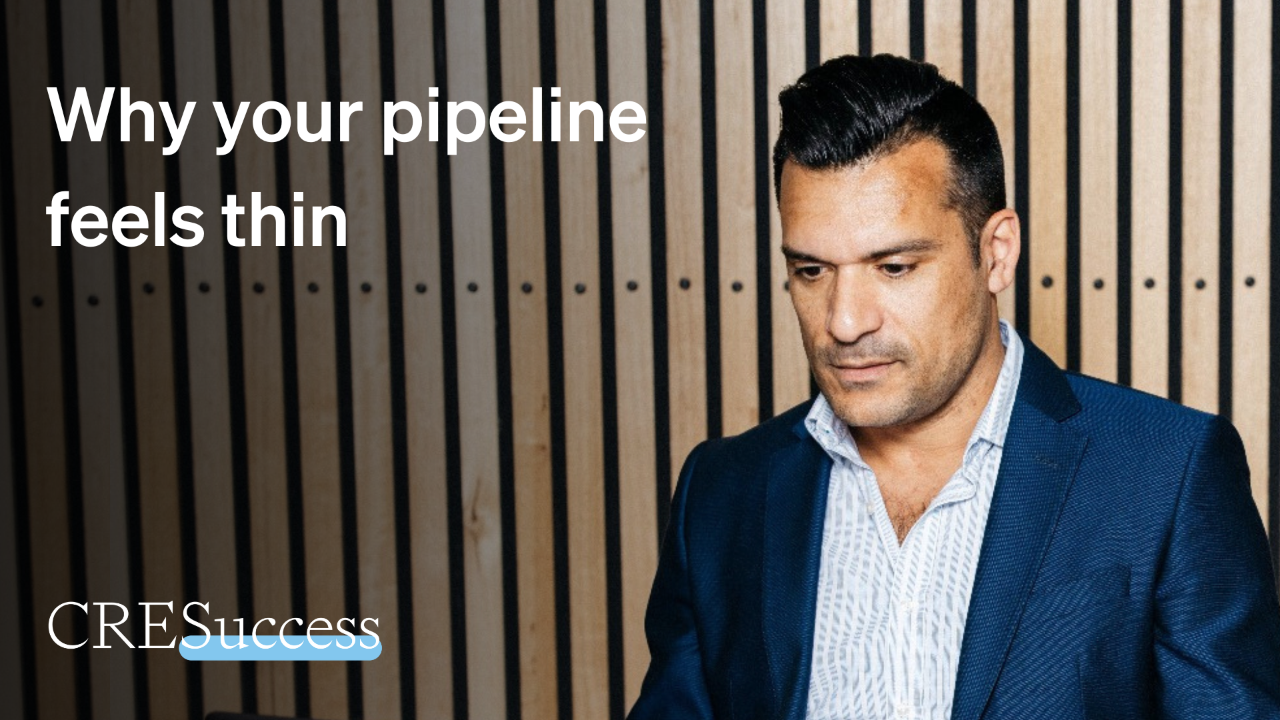Instead of doing everything you can, try being better at everything that matters
Oct 26, 2022
Top performers in commercial real estate don't maintain their position by doing everything that can possibly be done.
Instead, they typically do everything that matters better than everyone else (and perhaps a little bit more, just to be diligent).
This is usually more than enough – and a much smarter approach than trying to do every single little thing (which is often a never-ending list).
So, if you’re committed to being the best, figure out what matters (and look for value adding opportunities to go the extra mile).
For a roadmap on how to focus on the activities that matter, so you have more time and can produce even better results, check out episode 111 of CRE Success: The Podcast.
Episode transcript:
One of the biggest dangers in commercial real estate is trying to do everything that you can, every single time in order to guarantee the result that you're looking for.
There are so many things which are beyond our control.
And if we try to do everything that we can, we'll end up doing more than we should, which can impact our productivity, and also detract from our ability to be the best.
So rather than doing everything that you can, today's episode is about how you can do more than enough in order to achieve more of the results that you're looking for.
Hello, and welcome to episode 111 of CRE Success: The Podcast. My name is Darren Krakowiak. And I help commercial real estate leaders to develop their people and to grow their business.
Really appreciate you listening to today's show or watching it on YouTube. Make sure you subscribe to the channel on YouTube, or subscribe to the podcast wherever you are listening, so you're always updated about new episodes as they are released.
Today's episode, as I mentioned, is about the danger of doing everything that you can.
And I think some people inaccurately equate doing everything that you can with being the best at what they do.
Now, I believe that being the best at what you do is striving to be better than your competitors at what you do. And that is how you'll become the best at what you do.
It doesn't mean to be doing everything that you can. Because doing everything that you can is a trap. And there are always more things that we can do.
So, the inspiration for today's episode came from a conversation I was having with a client very recently. And they were talking to me about the fact that a deal didn't work out the way that they wanted.
And they told me that, "Darren, I did everything that I could. What else could I have done in order to get this deal over the line and to get the result that I was looking for."
And I said, "Well, there must have been something else you could have done." And he started thinking and going, "Yeah, I could have done this," or "I could have done that."
And look, you will never ever run out of things to do. There is always something more that you can do in order to make yourself feel like you've done everything that you can. Because that's a never-ending pit. There's always something more that can be done.
But it's not going to help you be the best. Because you can become the best by doing more than enough.
And in fact, I think that is a better route to becoming the best - doing more than enough as opposed to trying to do everything that you can. Because doing everything that you can, only leads to disappointment. The more that you try and do everything that you can, the less likely it is that you will get everything that you want.
As you try and do everything that you can on one thing, you'll start having less time for doing all the other things that need to get done. And it will be potentially wasted time because there is something called diminishing returns.
And the more that you work towards something, the less productive that you're going to get at it.
For example, if you spend 10 hours on a certain project. That's great, and that will likely get it to where it needs to be. But if you spend 20 hours on the project, you'll possibly get a similar outcome, but it won't have been as productive used of your time. Because the rest of the 10 hours is not going to be as productive as those first 10 hours would have or should have been.
So, the best don't do everything that they can, the best do everything that matters better than anyone else.
And then, perhaps they do a little bit more, just in case, just to be safe.
So, if you're committed to being the best, my recommendation is do everything that you should do, and then do a little bit more to go the extra mile. It is a good expression. When you go the extra mile, there's no traffic. Because most people don't go the extra mile. They don't do more than enough; they just do the bare minimum.
When you do a little bit more than enough, you'll be setting yourself apart from nearly everyone else who you're competing with. And you'll most likely have done more than enough than that you need to have done in order to achieve the result that you're looking for.
If you go the extra mile and it doesn't work out, what do you do? Well, you can be reassured that you've likely done enough and anything more that you could have done would likely have been wasted energy and resources.
Because doing too much can detract from your ability to be the best by getting stuck down endless rabbit holes because of like I said the law of diminishing returns.
So don't do everything that you can, just do what you can and a little bit more or what you should do and a little bit more and that will be enough. And then the outcome, the result, the decision rests in someone else's hands.
You relinquish control at some point by handing over the decision to somebody else. And when you relinquish that control, I think, have competence in knowing that you've done everything that you should add a little bit more, as opposed to doing everything that you can, when doing everything that you can, still doesn't guarantee that you're in control of the final outcome.
Because ultimately, how things work out is often beyond your control. There are certain things that you can control. You don't gain more control by doing everything that you can.
Let me explain how this works in practical terms in another area. And I think prospecting is a good one, because a lot of people want to be super prepared for prospecting.
So, before they pick up the phone, they get stuck in procrastination, as opposed to just picking up the phone and starting a conversation. Now, for sure, you should do some research before you do pick up the phone. But there's a limit to the amount of research that you should do, beyond which it becomes an unproductive use of your time.
And one way that you can check yourself to make sure that you're not procrastinating rather than prospecting, is just to set a limit on the number of things that you'd like to know about a prospect before you do contact them.
It might be 5 things, or maybe it's 10 things that you try to find out before you actually pick up the phone. And maybe you even set a time limit. And you say, "If I don't find out everything that I would want to know, within 5 minutes or 10 minutes in these 10 areas, then I give up and I pick up the phone. And I believe that what I found out in the first 10 minutes is enough."
If you're doing much more high-volume prospecting, it's probably more likely 2 minutes or 3 minutes. But whatever the case is, you set a time limit and you don't allow yourself to be outdone by procrastination, in favor of making progress with your prospecting.
So, a way to look at this, I believe, is to not be a know-it-all, but do know enough so you can ask the right question. No one wants to speak to a know-it-all. And if you already know everything, then you don't really have much reason to be contacting the prospect.
But if there's something more that you can learn, you have some context about what it is that you would want to learn, because you've done a little bit of research that can make your prospecting more purposeful.
On the other hand, of course, we don't want to know nothing. When we know nothing, then we'll clearly be a no nothing who has no context and might be asking the completely wrong questions and doesn't have enough information to lead the conversation in the direction that we want to go down.
So, doing just enough prospecting, doing just enough of our research before we start prospecting is a way that we can make it more purposeful, but also not get stuck in procrastination, to make sure that we are still making progress and taking action.
Now, if you are a leader in commercial real estate, one thing that I would recommend that you do in this area, and it's something that some leaders that I worked with in the past helped me with, is making sure that we support our people when they have done what we believe is the right thing.
And they've done not everything that they can, but they've done more than enough and things don't work out the way that we want them.
We want to reassure them that they've done more than enough and let them know that we support them and that sometimes things just don't work out the way that we want. Because I think this conversation about what more could we have done is sometimes not a very productive conversation.
If there are things that have been done that weren't done correctly, yes, that is appropriate. But if things have been done appropriately, and it's just one of those things where we didn't actually get the result that we're looking for, then lamenting over what more could have been done, perhaps is not the best use of time, as opposed to just helping people who are less experienced than you, understand that sometimes we're not going to win them, because we just don't win them all.
And reinforcing the things that had been done correctly and letting them know that there are some things that are beyond our control. And we need to focus on the things that we control by doing what it is that we should be doing in order to increase our chances to win.
If you found today's episode helpful, and you want some support to develop your people and also grow your business, that's something that we help commercial real estate leaders here at CRE Success.
You can go to cresuccess.co/leadership. Leave your details there and then we'll get in touch and we'll create a plan to look at one of the areas in which you can activate more growth within your team. It's all about your leadership and the people that you lead in order to create more growth in your business.
That is our episode for today. As always, thank you so much for listening and I will speak to you soon.








